Imagination and Innovation x 10
Celebrating the Emory Center for Digital Scholarship’s first decade
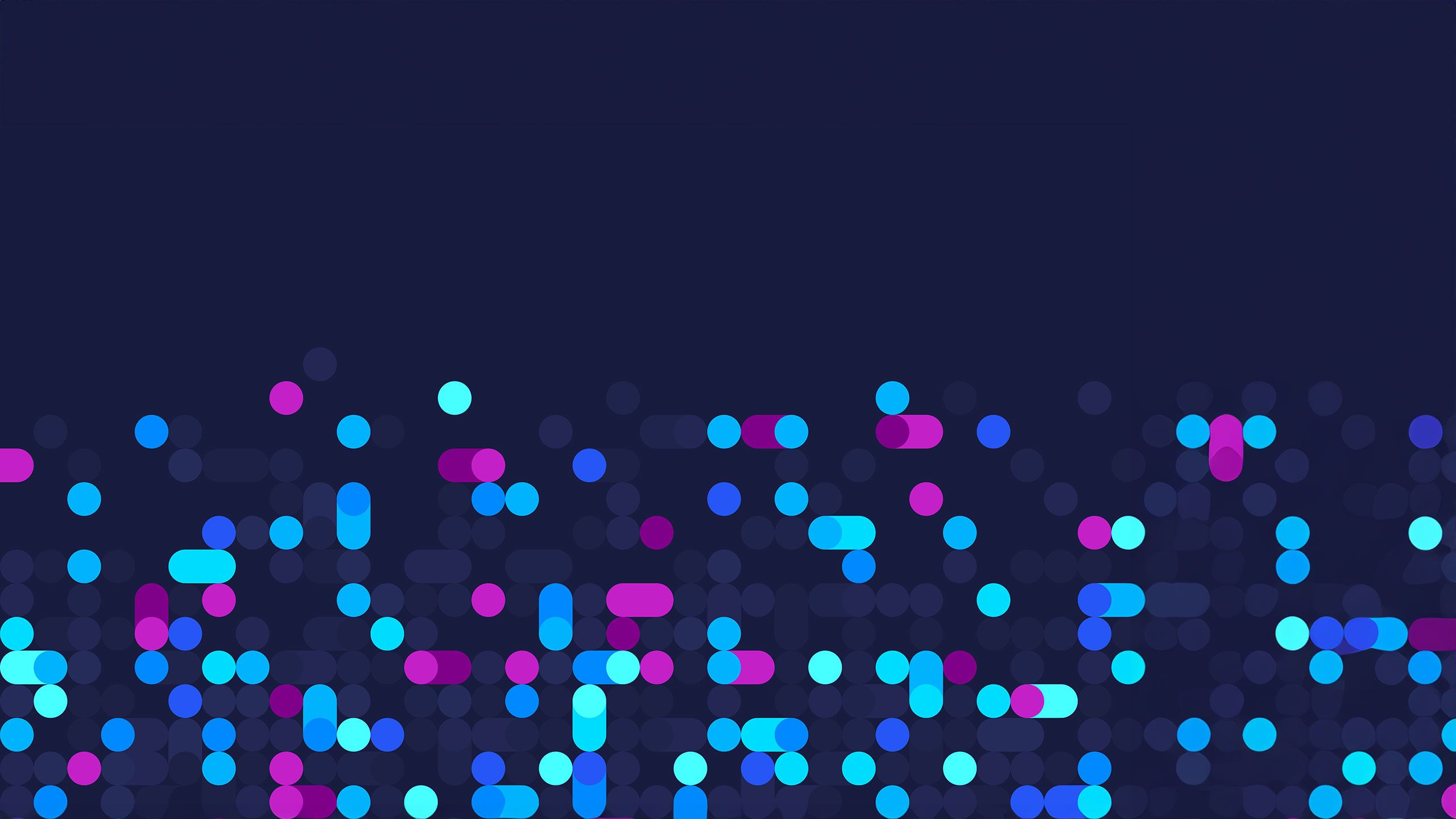
The world’s foremost online resource about the trans-Atlantic slave trade. An in-depth learning hub focused on the Apollo 15 lunar landing mission. A digital atlas exploring the ecology and geography of the Georgia coast. One of the first multimedia, open-access journals, transporting readers to the real and imagined spaces and places of the U.S. South.
The 10th anniversary of the Emory Center for Digital Scholarship (ECDS) is an occasion to celebrate its innovative projects, vaunted graduate training program, unwavering commitment to accessibility and persistent drive to stay ahead of technology’s ever-advancing curve.
A collaborative research center, ECDS — since its founding in 2013 — has excelled in creating models of digital scholarship geared to both academic and public use. Supporting the research of Emory faculty, staff and students, the center also works with partner institutions and not-for-profit organizations.
ECDS staff, housed on the third floor of the Robert W. Woodruff Library, welcome hearing from faculty, students and staff who have projects in mind. They also deploy their experts to Emory classes to assist faculty in integrating technological advances into their teaching — from digital storytelling and textual analysis to mapping and data.
The first 10 years

Groundbreaking digital scholarship
Without doubt, the most visible of ECDS projects, admired internationally, is Slave Voyages.
Scholar David Hackett Fisher notes, “During the early 21st century, new methods and tools of truth-seeking have been put to work on a large scale in the history of slavery and race in America. The leading example is the Trans-Atlantic Slave Trade Database,” his reference to what is now known as Slave Voyages.
The database chronicles more than 36,000 voyages that forcibly transported enslaved Africans across the Atlantic between 1514 and 1866. Emory has documented the evolution of this ambitious project — its enormous leap from the punch cards and CD-ROMs with which former Emory professor David Eltis began his research before he turned to staff at ECDS.
Today, Slave Voyages is maintained through a consortium that includes Emory and represents a new model for sustaining large-scale digital humanities research.
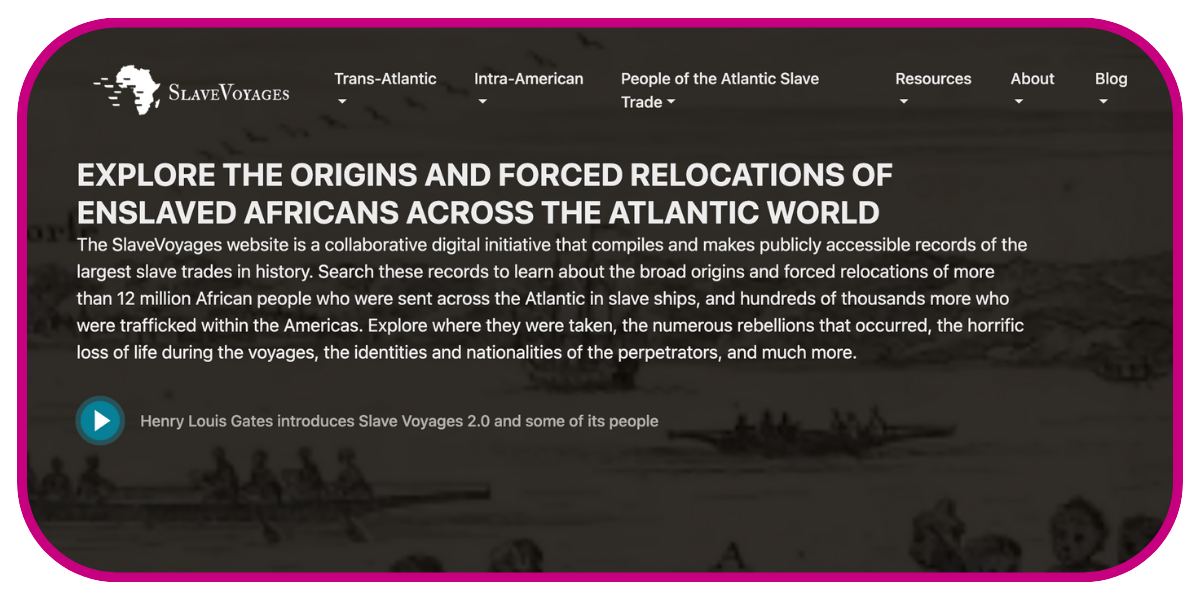
Slave Voyages began as a series of CD-ROMs in the hands of former Emory professor David Eltis. Today, it is a website utilized around the world, managed by a consortium that includes Emory.
Slave Voyages began as a series of CD-ROMs in the hands of former Emory professor David Eltis. Today, it is a website utilized around the world, managed by a consortium that includes Emory.
Southern Spaces, which relies on ECDS graduate students and staff who manage the publication and keep its technology leading-edge, will celebrate its 20th anniversary in 2024. A foundational multimedia, open-access, peer-reviewed source for critical regional studies, it has been an enduring model for digital journal publishing.
The website Holocaust Denial on Trial was created to enable Deborah Lipstadt, Dorot Professor of Modern Jewish and Holocaust Studies — and now Biden administration Special Envoy to Combat and Monitor Antisemitism — to disprove the false claims of Holocaust deniers.
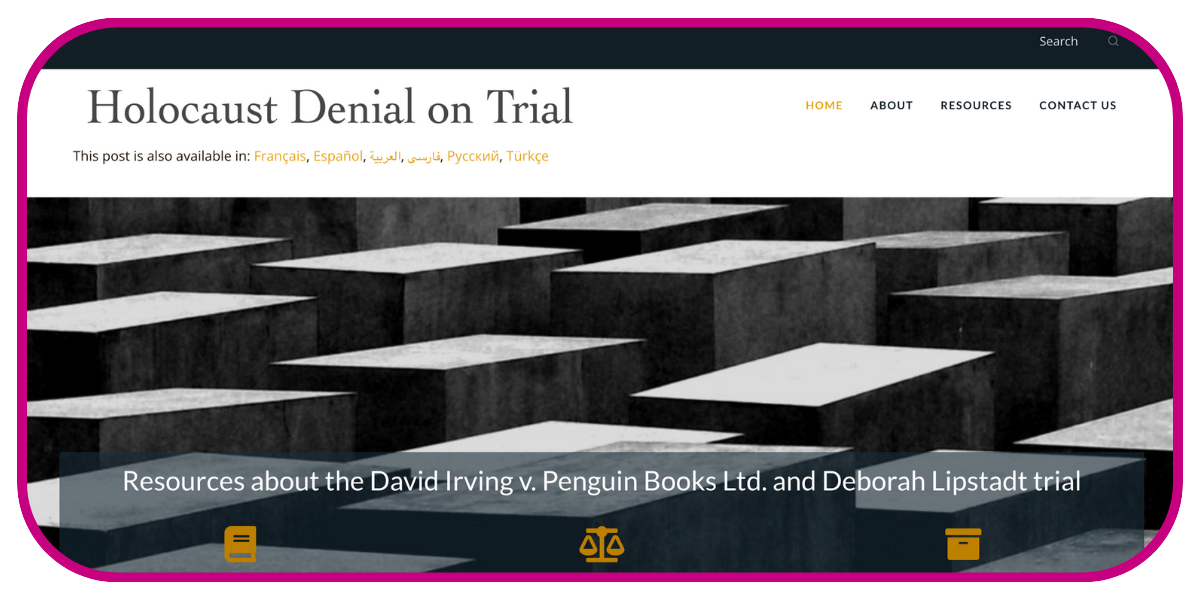
Created in collaboration with Emory professor Deborah Lipstadt, Holocaust Denial on Trial ensures access to the evidence, transcripts, judgment and appeal documents in the David Irving v. Penguin Books U.K. and Deborah Lipstadt trial and refutes the misleading claims of Holocaust deniers with historical evidence.
Created in collaboration with Emory professor Deborah Lipstadt, Holocaust Denial on Trial ensures access to the evidence, transcripts, judgment and appeal documents in the David Irving v. Penguin Books U.K. and Deborah Lipstadt trial and refutes the misleading claims of Holocaust deniers with historical evidence.
All told, more than 60 projects are listed on the center’s website, each in its own way highlighting the ECDS mission to lift up the work of Emory’s faculty and, in the process, train graduate students to enlarge their skills through digital scholarship.
The road to center status
A key factor in the center’s success is that its founders, Wayne Morse Jr. and Allen Tullos, were at the helm together until Morse retired in spring 2023. A decade ago, they and others — including faculty, librarians and administrators — got together to plan, says Morse, “what the future looked like in digital pedagogy, research and publishing.”
At the time, Emory had a series of loosely interconnected organizations doing various aspects of this work: the Beck Center, focused on manuscripts and books; a data center doing statistical analysis; the Center for Digital Pedagogy, centered on teaching and technology; and DISC, the beginnings of a digital scholarship commons.
Morse and Tullos were tasked with bringing digital scholarship from the periphery into the center of Emory’s academic life. “I was charged with getting faculty on board with some of these new technologies while making digital scholarship seem less exotic and arcane,” Tullos says.
Graduate student development was, and remains, a central goal. An impressive “Where are they now?” spreadsheet maintained by ECDS speaks to the success of the training mission the center prioritized from the start.
According to Tullos, “Graduate students in the humanities are often looking for new ways to apply their degrees. By combining their studies with skills learned at the center and the chance to work with faculty, they can be considered not only for academic positions but for roles at other digital centers, museums, university presses and journals — as well as consulting and corporate jobs.”
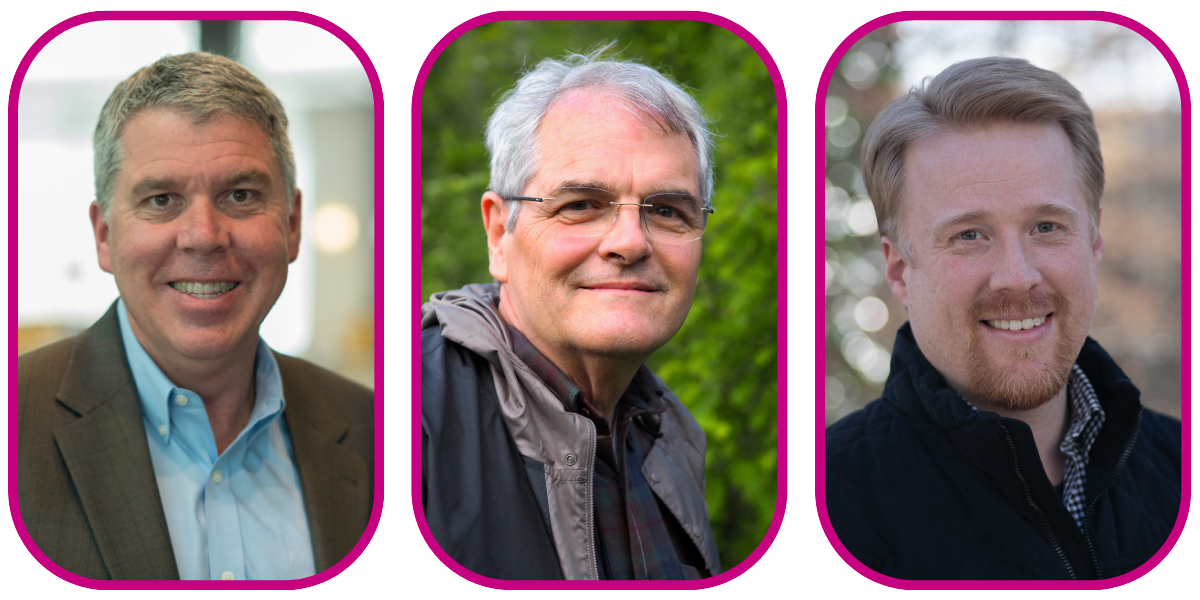
(l-r) Wayne Morse, Allen Tullos and Chase Lovellette. Morse and Tullos are the founding co-directors; today, Tullos and Lovellette direct the center's activities.
(l-r) Wayne Morse, Allen Tullos and Chase Lovellette. Morse and Tullos are the founding co-directors; today, Tullos and Lovellette direct the center's activities.
When Morse stepped down, Chase Lovellette, who had been part of the center since its founding, joined forces with Tullos as co-director. Asked how they subdivide duties, Lovellette says: “I am ‘the how and the when.’ Allen is the ‘why.’ As a collective, we figure out the ‘what.’”
Today, the center’s broad range of research and service areas include accessibility, geographical information systems (GIS) and mapping, publishing, multimedia production, network analysis, online exhibits, pedagogy, statistical analysis, text analysis and extended reality (XR) projects built upon video gaming platforms.
“The way we built the center is unique, though some have tried to replicate it. The architecture we put in place has allowed us to do dynamic and innovative things,” says Morse.
Those who have been part of the center praise its culture, which Lovellette describes as “yes/and.” “Everyone has the chance to share their viewpoints. That requires a lot of trust and understanding,” he contends.
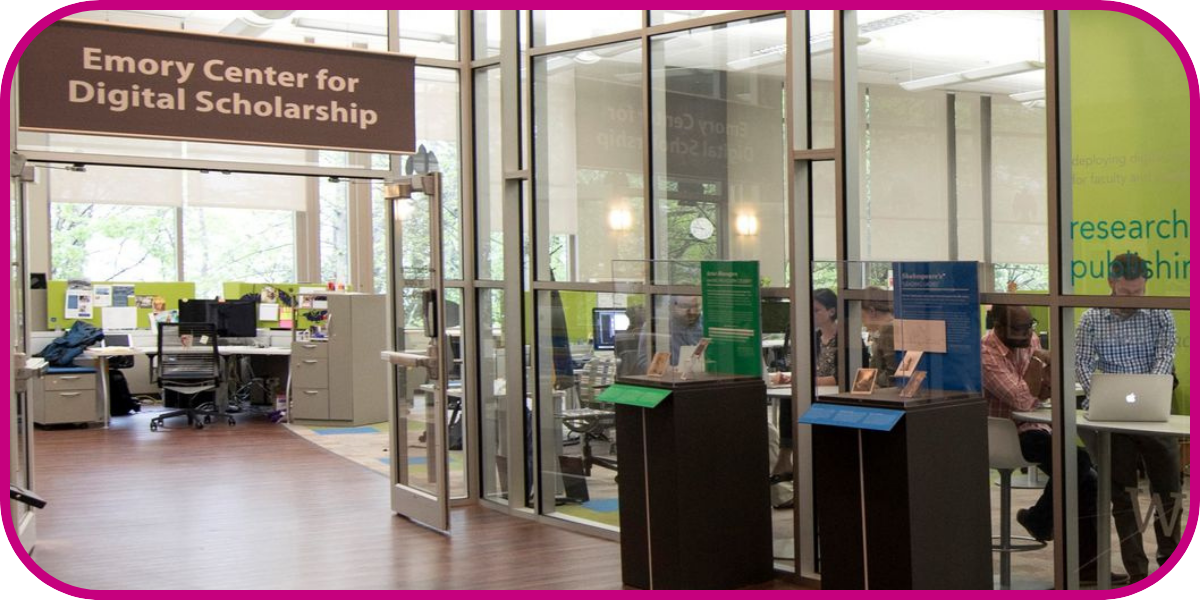
Housed on the third floor of the Woodruff Library, the Center for Digital Scholarship welcomes hearing from faculty, staff and students who want to collaborate on projects.
Housed on the third floor of the Woodruff Library, the Center for Digital Scholarship welcomes hearing from faculty, staff and students who want to collaborate on projects.
What’s ahead in the next decade?
Lovellette says experience has taught him that strategic plans have limited value. The center started with five-year plans that “over time, got shorter rather than longer.” He confesses that he has “no idea” where the center will be in 10 years.
“Not being able to map everything in our future is part of the excitement of it,” he says. “We are the PA system to herald the remarkable scholarship at Emory, to help give it new features and be more accessible.”
Many early decisions have had lasting benefits: not overbuilding platforms, enabling graduate students to complement center staff, encouraging agency and professional development among the staff and building trust with faculty.
With those precepts in place, staff are ready for AI, XR, digital monographs or whatever the next important scholarly innovation might be.
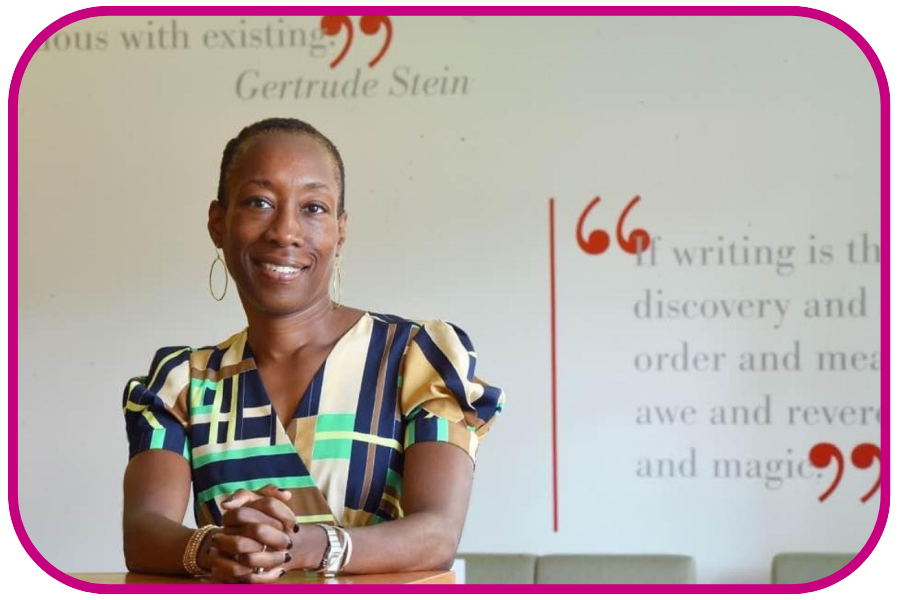
Valeda Dent, vice provost of libraries and museum, notes that the center's work is both "deeply technical and profoundly human."
Valeda Dent, vice provost of libraries and museum, notes that the center's work is both "deeply technical and profoundly human."
Valeda Dent, vice provost of libraries and museum, notes that “ECDS reflects the highest levels of creativity, digital innovation and interdisciplinarity. The work can be deeply technical but also profoundly human — that’s what makes their projects so unique. ECDS staff build lasting partnerships with faculty and researchers, supporting them as they bring their work to life.
“As ECDS celebrates 10 years, we’re thrilled that the university community will benefit even more from their expertise and experience.”
Projects + People
Walk through just a few of the many innovative projects created by ECDS

Staffer: Joanna Mundy
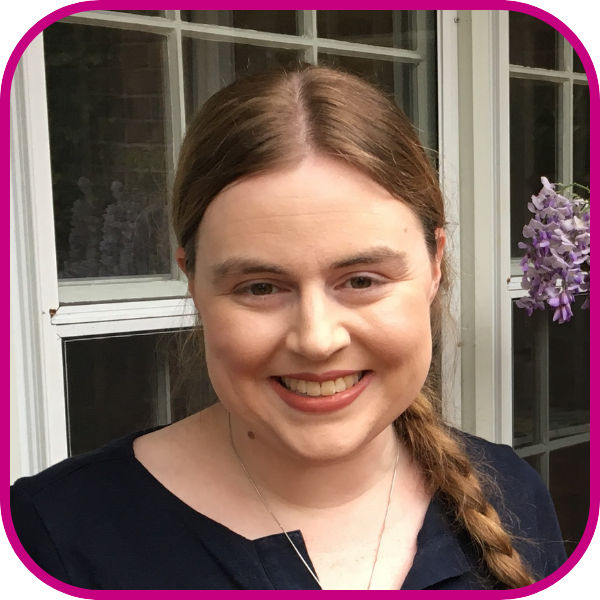
Joanna Mundy 18PhD, digital projects specialist, came to ECDS through a completion fellowship while an art history graduate student. Aware of the central role that digitization was playing in her field, Mundy dove in, learning how to do text markup with XML, text analysis, databases and digital exhibitions. She also focused on creation of MySQL databases and Django-based web applications.
Those skills have enabled her to contribute to a host of projects, including OpenTour Builder, an open-source software platform for building geospatial tours optimized for mobile devices.
Though the center doesn’t build many software platforms, community groups in the U.S. and Europe are grateful for this one. Mundy proudly points to the fact that the app “provides access to often-forgotten or erased historical spaces.”
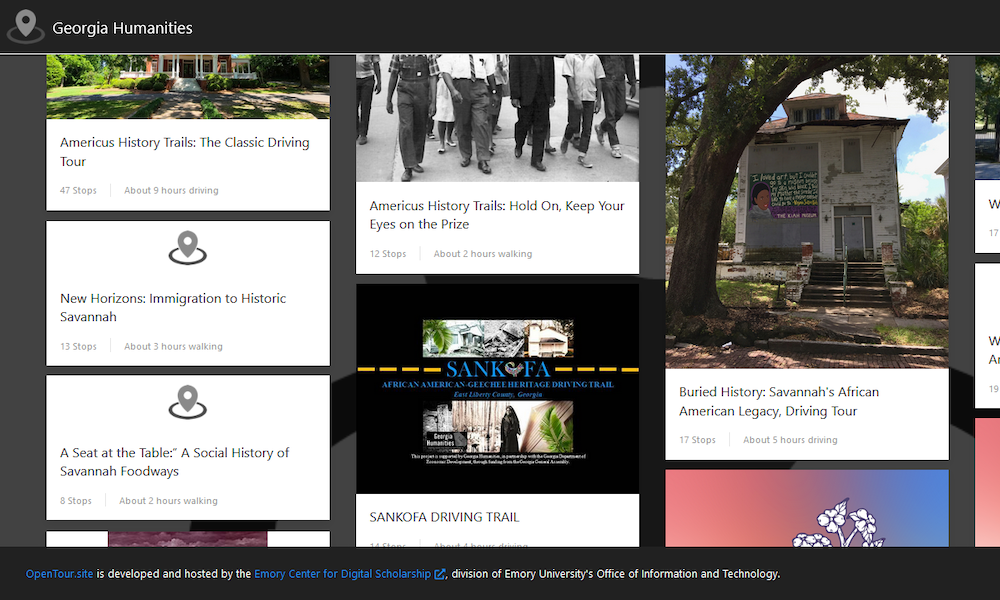
The Georgia Humanities OpenTour page gives a flavor for the variety of tours the software has generated, not just in the U.S. but in other parts of the world.
The Georgia Humanities OpenTour page gives a flavor for the variety of tours the software has generated, not just in the U.S. but in other parts of the world.
She says: “I like the nature of our work, switching from project to project, doing multiple things. We bring in a range of skills and people, which makes it exciting. There is always somebody you can ask for help. I also like quiet days, just digging into Python.”
Project: Envisioning Baroque Rome
Partner: Sarah McPhee, Samuel Candler Dobbs Professor of Art History
No project, arguably, is closer to Joanna Mundy's heart than Envisioning Baroque Rome, which she started working on with professor Sarah McPhee as part of her graduate work. To render this 17th-century, walkable reconstruction of Rome, Mundy collaborates with ECDS visual design specialist Ian Burr 17C and 3D artist John Halbert.
This 3D digital reconstruction of the Baroque city is grounded in the celebrated bird’s-eye-view map of Giovanni Battista Falda made in 1676. In this virtual world, the user may stroll the streets, take in historical prospects from the summit of hills and towers, explore vanished neighborhoods, listen to lost fountains and watch as papal processions pass through the Roman Forum.
“It is hard to overstate the gratitude I feel for the remarkable staff of ECDS for their sustained support of Envisioning Baroque Rome,” McPhee attests. “There is no comparable project in kind or scope. Nothing I have done in my 30-year career as an architectural historian has taught me more about the Baroque city.”
This video enables online travelers to experience the via Parione from the Castel Sant'Angelo to the Piazza Navona, along a portion of the route of the Papal Possesso.
Staffer: Steve Bransford
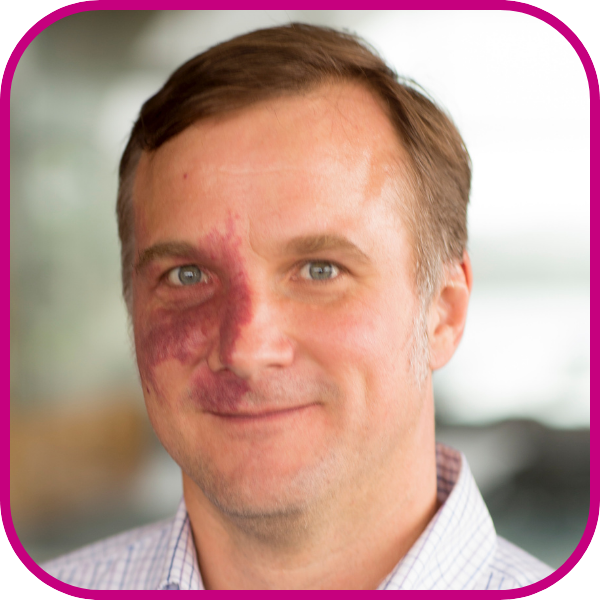
Steve Bransford 08PhD, senior video producer, was the first ECDS staffer hired to provide video services in 2016.
Having been a visiting assistant professor at Emory after completing his doctorate, he appreciates the relationship that center staff and students have with faculty. “We collaborate as peers,” says Bransford, noting that “our staff learn as much as they can about the subjects faculty are exploring and, in turn, the scholars want to learn about the technology that can enhance the way their material is presented.”
Bransford has been part of the ongoing Georgia Coast Atlas project, a collaboration with Environmental Sciences faculty members Anthony Martin, professor of practice, and Michael Page, geographer and assistant teaching professor. They wanted to redefine the concept of a traditional atlas by using digital scholarship to explore the ecological and geographic dimensions of the Georgia coast.
“I cut my teeth doing drone videography, which was really thrilling,” Bransford says. The site now contains flyover videos of several of Georgia’s 12 barrier islands and is steaming toward its ultimate goal — creating a comprehensive digital atlas for the entire 100-mile Georgia coastline.
Hands down, says Bransford, “the videos of the slave ships Marie-Séraphique and L’Aurore, part of the Slave Voyages project, are the most impactful work I have done, receiving hundreds of thousands of views, having been accessed in 171 countries and with museums in Europe and South America using them in physical exhibitions.”
“I had to think like a cinematographer,” Bransford observes. Every contributor had painstaking challenges, he says, concluding: “It was a fun process of working with a lot of really smart, talented people.”
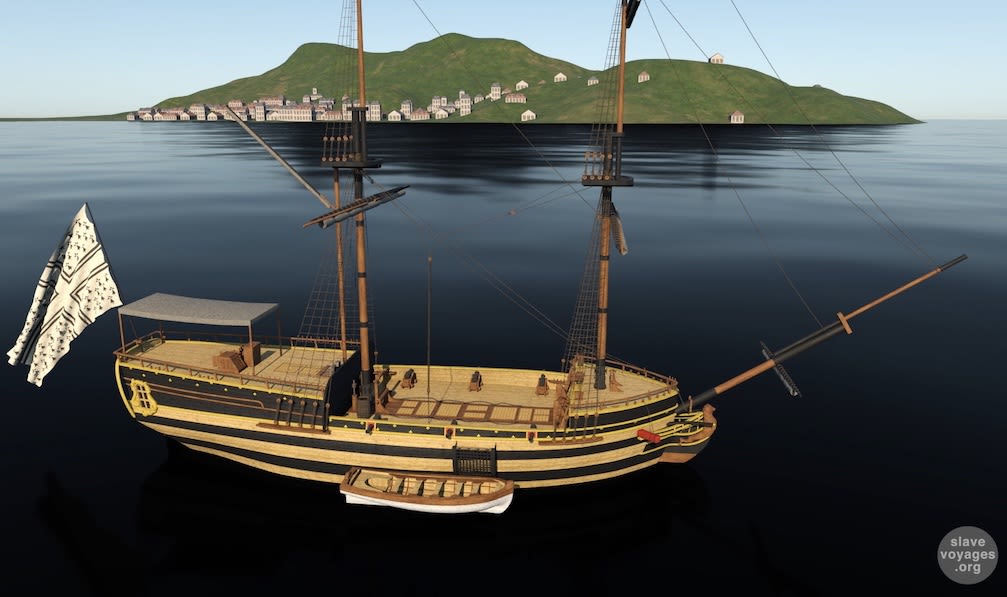
A still from Bransford's video of the Marie-Séraphique, which transported more than 1,300 slaves in the course of four voyages between 1769 and 1774.
A still from Bransford's video of the Marie-Séraphique, which transported more than 1,300 slaves in the course of four voyages between 1769 and 1774.
He says: “One of the reasons I really love this job is how unbelievably eclectic my range of tasks is. Every day is different, and I have such gratitude for that.”
Project: The Apollo 15 Learning Hub
Partner: Tracy L. Scott, associate teaching professor, Department of Sociology
Between 2015 and 2019, with Steve Bransford and Joanna Mundy playing prominent roles, ECDS staff worked hard to get this hub ready for the 50th anniversary of the Apollo 15 lunar landing mission in 2019.
It was a collaboration that began when Wayne Morse and faculty member Tracy Scott served together on a committee, and Morse heard that David R. Scott — Tracy’s father and the commander of the flight — had all the flown mission manuals from Apollo 15, which he wanted to digitize and post online. Morse knew immediately that he wanted to bring the resources of ECDS to bear to help make this a reality.
The significance of having the “flown” mission manuals is that the crew made many handwritten notes that were not recorded elsewhere. Moreover, in terms of historical significance, that mission marked the first extended scientific exploration of the moon, and no human has been back there since 1971.
Besides the online hub, many of the primary source documents are housed at the Stuart A. Rose Manuscripts, Archive, and Rare Book Library and resulted in an exhibition at the Emory Libraries that ran from July 2021 to May 2023.
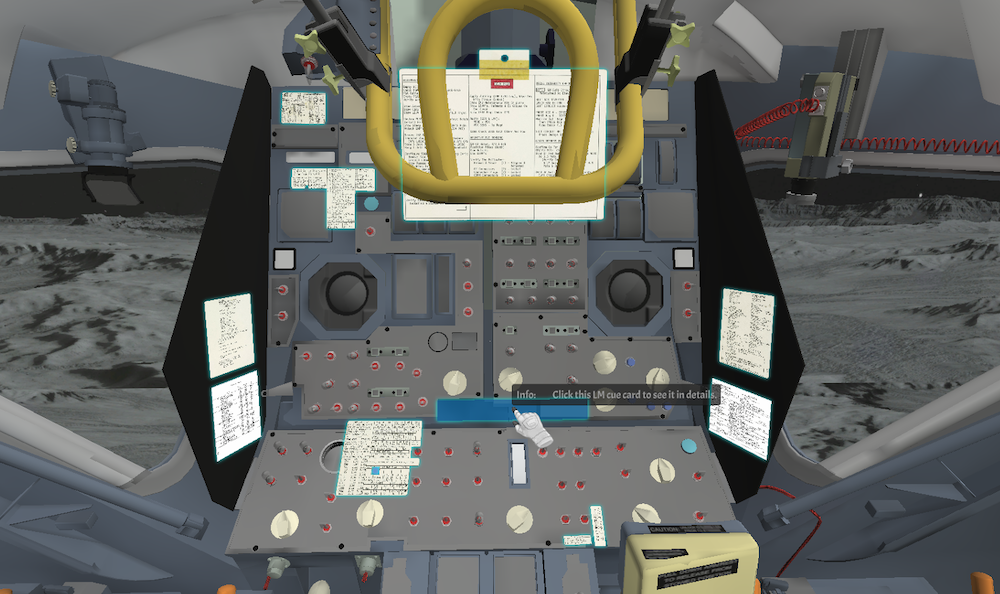
A view of the forward panels inside the Lunar Module. Courtesy NASA.
A view of the forward panels inside the Lunar Module. Courtesy NASA.
According to Scott, “What started out as a small project to digitize these manuals became something so much bigger. My dad had a vision for what this could be, but the staff at ECDS brought it to life in even richer ways that are so historically important.”
Commander Scott performed the experiment Galileo is said to have conducted at the Tower of Pisa, simultaneously dropping a hammer and feather and observing that they struck the ground at the same time regardless of their mass. A nation watched in wonder.
Alumna: Kayla Shipp
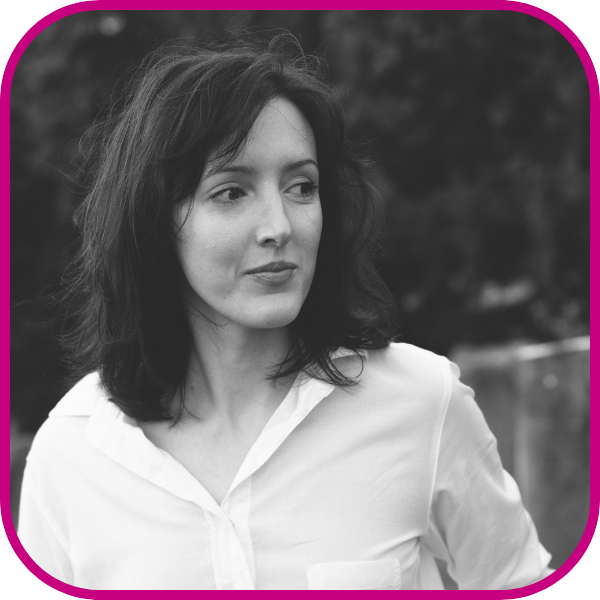
Kayla Shipp 20PhD, former digital specialist for ECDS, now serves as digital humanities program manager at Yale University. As an undergraduate majoring in English with a computer science minor, Shipp wrote an honors thesis “that was asking digital humanities questions,” she says.
She went on to earn a master’s in digital humanities at King’s College London, which was the first program of its kind. When she explored Emory as a place to do doctoral studies in English, ECDS was a major calling card.
“Many of the universities I considered had centers just getting started, but ECDS has long been active in the digital humanities space. Sometimes this work can be isolating because it doesn’t have structural support in institutions, but that was not the case at Emory,” she notes.
Shipp wanted to find work in the digital humanities, which led to Allen Tullos serving on her dissertation committee. She was a trailblazer in figuring out what constituted a “digital dissertation.” “I had great support,” she recalls, “but I had to really drive this process to figure out what the structure was.”
Partnering with the Arts and Social Justice Fellows Program was “enormously fulfilling,” according to Shipp. Just as COVID-19 hit, the involvement of ECDS made it possible to go online. “They had beautiful work and no place to display it, so they came to us. We made it possible for the students’ work to exist outside class,” Shipp indicates.
As she was finishing her third year, a staff position opened at ECDS, and Shipp made short work of applying. All told, she moved from being part-time as a graduate student to full-time as a graduate student and then joining the staff. “On paper, those seem like difficult transitions,” Shipp says. “But I never felt as if the view of my worth was tied in any way to my level in the organization.”
Now as program manager for Yale’s Digital Humanities Lab, Shipp builds relationships with departments, institutes and library staff. She manages a number of graduate student programs, which harks back to experience she had at ECDS working with the Digital Dissertation Scholars Program.
She says: “Digital humanities doesn’t need to prove its value anymore. We now are in a moment of greater criticality: how does using any given tool or material impact how you do or present your research?”
Project: Journal of Humanities in Rehabilitation
Partner: Sarah Blanton, professor, Department of Rehabilitation Medicine
It was 2014 when faculty member Sarah Blanton approached ECDS with what she describes as “a naïve idea for a new journal.” It became something unique in the rehabilitation field: an internationally recognized, peer-reviewed, multimedia journal guided by an editorial board of award-winning health humanities and rehabilitation scholars.
Kayla Shipp got involved in fall 2018, when the journal was undergoing its first redesign. When she became full-time two years later, she led the web-production efforts for the journal.
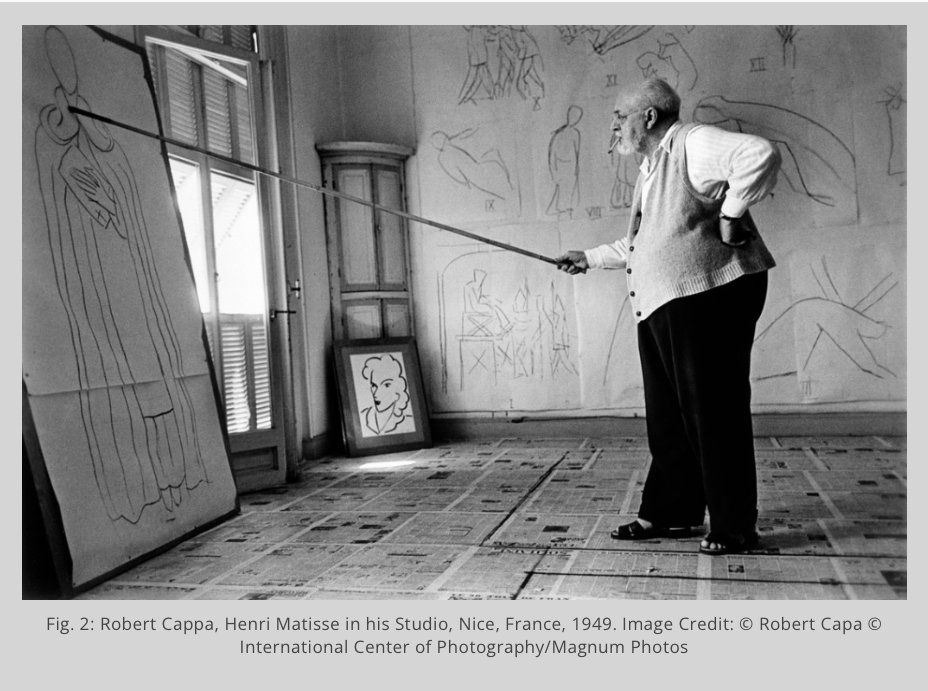
An image from the article "Matisse: Innovation in the Face of Physical Limitations." After suffering duodenal cancer, Matisse could stand or sit upright only for short periods. Photographer Robert Cappa captured him using a pole with charcoal attached so that he could overcome his physical limitations and still create.
An image from the article "Matisse: Innovation in the Face of Physical Limitations." After suffering duodenal cancer, Matisse could stand or sit upright only for short periods. Photographer Robert Cappa captured him using a pole with charcoal attached so that he could overcome his physical limitations and still create.
“We created a platform to investigate the deeper meanings of humanism in rehabilitation,” says Blanton, who serves as editor-in-chief of the journal.
The journal also offers dynamic training opportunities for students to learn skills in digital publishing and scholarship.
“Through opportunities afforded by the exemplary team at ECDS, we have reimagined rehabilitation science education and practice through a humanities lens to foster greater humanistic care,” Blanton notes.
The next generation of digital scholars

A stepping stone for graduate students
Each year, ECDS employs 20 to 30 graduate students who learn new digital tools and methods, work on projects alongside faculty and staff, and teach workshops for other students.
“Our graduate colleagues often take integral, leading roles on projects, from web design to data cleaning and from video editing to mapping,” emphasizes Alexander Cors 22PhD, digital scholarship specialist and coordinator of the center’s graduate training program.
He has the personal experience to back up his claims, having worked at ECDS since his second semester at Emory, before becoming a full-time staff member in 2022. Cors manages ECDS graduate programs like the Digital Scholarship Training Program and new internship offerings.
“ECDS gave me the space to learn about the many different tools scholars can use. Two years later, I was leading faculty consultations on using digital maps for public scholarship. I focused on mapping in my dissertation, which was a main reason it was awarded the prize for the best dissertation from the American Society for Legal History. ECDS has been a crucial part of my journey as a scholar and educator,” Cors says.
Setting students up for success involves a combination of training, project work, professional-development workshops and one-on-one career coaching.
“We have a great track record of former ECDS members securing dream jobs as professors, instructional designers and higher education professionals, in private industry working with data, digital marketing and storytelling, or in different types of media,” according to Cors.
Madison Elkins 23PhD, like Kayla Shipp, began working with ECDS as an Emory doctoral student and has gone on to a career in digital scholarship.
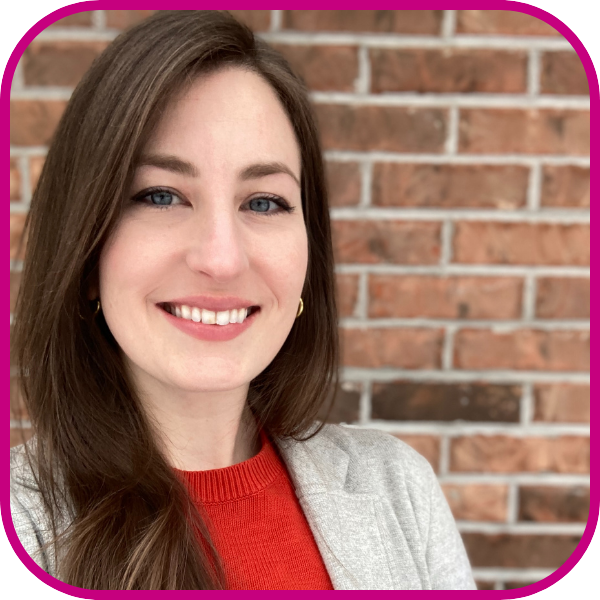
Madison Elkins
Madison Elkins
While completing her PhD in English, she first joined Southern Spaces as an editorial associate. She moved up rapidly and served as managing editor, the top graduate student position, for five years between 2016 and 2021.
A sizable aspect of her responsibility there was training the graduate students who staff the journal. Work on the journal also helped her “think through how to assess arguments and scholarly impact, which influenced how I thought about my research and made me consider my own writing in a new way.”
When Elkins interviewed for her current job at Duke University Press, where she manages 10 journals, her experience at Southern Spaces carried enormous weight, with the Duke offer being just one of several she received.
“I always felt lucky to have the resources of ECDS — the people as well as the tools and knowledge they had,” she says. “Our editorial staff had access to the experts in video and digital mapping, which created, in essence, a ‘super team.’ It was a lovely environment.”
Current student: Ekram Towsif 26PhD, digital scholarship assistant
Laney Graduate School, where Ekram Towsif is pursuing his doctorate in physics, made him aware of opportunities at ECDS, and he joined in the hope not only of learning ways to advance his research but also “to give back to Emory’s community.”
And that he does, providing frontline assistance to faculty in a variety of ways — everything from troubleshooting issues on websites to advising how to edit podcasts. Towsif appreciates the flexibility ECDS offers: scheduling him around duties in his program, letting him choose the skills he develops and giving him options as to the projects he joins.
Work at ECDS, says Towsif, “is helping me better analyze data from my discipline and visualize the data in a way that will help me share my insights with others.” His eye is especially on artificial intelligence (AI), which, given the sheer quantity of data in physics, he notes could “speed things up significantly.”
He says: “ECDS is important because there is always new technology being developed, AI being just one example. How should we use these technologies in our research? Emory as a whole, and ECDS in particular, are trying to guide faculty and graduate students.”
Current student: Noah Gounoue 26PhD, digital scholarship assistant
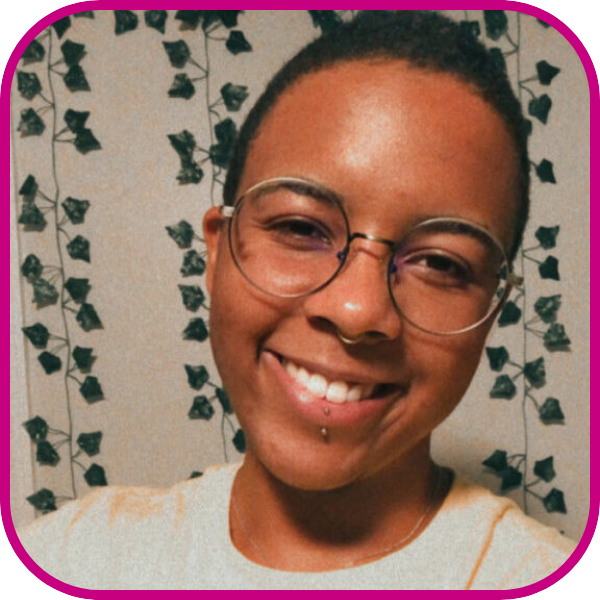
Noah Gounoue
Noah Gounoue
Having completed his undergraduate degree in philosophy and educational sciences in Germany, Noah Gounoue found the U.S. a more fertile field for engaging the feminist topics that interest him. A philosophy doctoral student who is passionate about teaching, Gounoue believes that “my work at ECDS has allowed me to come full circle in uniting philosophy, pedagogy and digital humanities.”
He has contributed at ECDS to all sorts of endeavors: among them, data-gathering projects, testing games and helping faculty create websites.
And, where his fellow staffers are concerned, “we talk about projects, our studies and interests, and you can also find a willing ear for personal matters,” he notes.
He says: “As a student here, I am acquiring theoretical foundations around pedagogy. But because I am working at ECDS, I can test what it means to teach something through a video, for instance, or a podcast or website. On the job market, I can point to papers I have written but also to these projects I already have produced. That is a huge accomplishment.”
Other experts round out a deep bench
- Bailey Betik 23PhD, digital publications specialist, works with students, faculty and scholarly journal staffs to design, build and maintain open-access websites. She also directs the ECDS kickstart initiative that showcases the professional profiles of Emory faculty.
- Senior digital scholarship strategist Jesse P. Karlsberg 15PhD is editor-in-chief of the Sounding Spirit Collaborative, a National Endowment for the Humanities–funded initiative in partnership with University of North Carolina Press. It promotes the publishing, research and teaching of sacred songbooks using the ECDS-created Readux digital scholarly editions platform.
- Data librarian Rob O’Reilly 03PhD conducts consultations with faculty and students about locating, analyzing and cleaning online research data.
- Megan Slemons, GIS librarian, provides online access to Emory’s map and geospatial data collections. She offers workshops and assists faculty and students who require maps for their publications.
- Software engineers Jay Varner and Yang Li turn ideas into code. They partner with Emory faculty to create database-driven websites and interface designs, as well as with the Fox Center for Humanistic Inquiry to publish scholarly digital monographs.
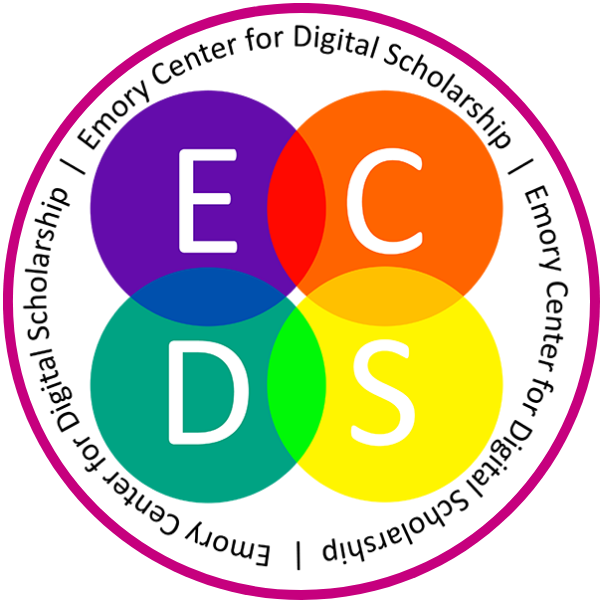
Story by Susan Carini 04G.
Design by Ruby Katz and Laura Douglas-Brown.

